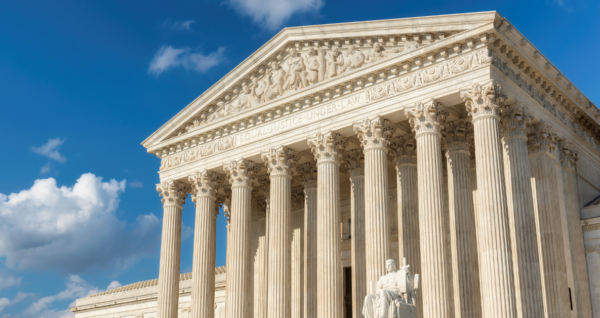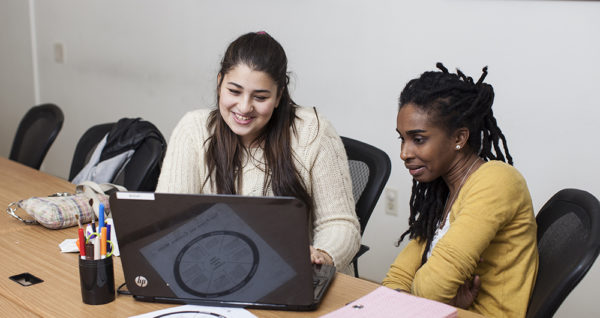Because tribal courts have been stripped of their sovereignty, violence against Indigenous women has long been a problem. But recent advances have restored partial criminal jurisdiction to tribes.
Molly Simons is an Institutional Giving Intern at Sanctuary for Families. A senior at Trinity College, she is writing a thesis about violence against Indigenous women. ________________________________________________________________________________
While only referencing the U.S., this blog post will use Indigenous to refer to American Indian and Alaska Native (AI/AN) communities and members.
Through legislative and judicial decisions, the U.S. federal government has finally started to allow tribal courts to try non-Indigenous defendants when they commit certain crimes against Indigenous tribe members on tribal land. This fight for expanded jurisdiction has been going on since the inception of the U.S., largely through advocacy work against federal overreach into tribal sovereignty. The Violence Against Women Act’s (VAWA) reauthorizations in 2013 and 2022 have been the culmination of this advocacy, expanding tribal court jurisdiction in significant ways.
To understand these recent expansions, it helps to know a brief history of tribal court criminal jurisdiction
Government overreach into tribal court jurisdiction began in 1883, when Crow Dog, a member of the Brule Sioux Tribe, was tried for murdering fellow tribal member Spotted Tail on reservation land. The Sioux Tribal Court handled the case, Ex parte Crow Dog, internally, but the US Territory of Dakota however, declared the Sioux decision insufficient and demanded the hanging of Crow Dog. The case was appealed to the Supreme Court, which ruled that the federal government did not have jurisdiction to try a crime committed by one Indigenous person against another Indigenous person if the crime occurred on reservation land or in Indigenous space.
Congress, which did not want to leave Indigenous power unchecked, reacted by passing the Major Crimes Act of 1885, which gave the federal courts exclusive jurisdiction over 15 major crimes—even if those crimes were committed on Indigenous lands by Indigenous defendants. The Major Crimes Act, still in effect today, not only stripped tribal courts of their sovereignty over those crimes, but also stripped them of decades of funding and money. Tribal courts were left without the resources to pursue domestic violence cases, leaving Indigenous space—particularly the space occupied by women—open for crime.
In 1978, tribal courts’ jurisdiction was narrowed even further. In Oliphant v. Suquamish Indian Tribe, the Supreme Court ruled that tribal courts did not have the right to try non-Indigenous defendants—even for crimes committed on Indigenous lands against Indigenous people. The ruling reversed a 1976 Ninth Circuit Court of Appeals decision that upheld the power of the Suquamish Tribal Court to try two non-Indigenous defendants for reckless driving, resisting arrest, and assault. The tribe argued, and the lower court agreed, that since the tribe had never ceded the power to try non-Indigenous defendants and Congress had never “expressly terminated” said power, the tribal court should have full jurisdiction. The Supreme Court disagreed and claimed that “absent an express congressional delegation of power,” the Suquamish Tribal Court did not have the jurisdiction to try the non-Indigenous defendants.
With tribal courts unable to prosecute non-Indigenous offenders, reservations became open space for crime and violence, especially violence against Indigenous women and children.
But, recent VAWA Expansions have sought to restore some criminal jurisdiction to tribal courts
Because tribal courts have been stripped of their sovereignty, violence against Indigenous women has long been a problem. But recent advances have restored partial criminal jurisdiction to tribes.
The Reauthorization of the Violence Against Women Act (VAWA 2013) and tribal court jurisdiction known as Special Domestic Violence Criminal Jurisdiction (SDVCJ) have opened doorways for tribes, allowing tribes to expand their courts’ jurisdiction and convict more defendants. While this was available and welcomed by tribes of the Lower 48 states in the U.S., virtually no tribes in Alaska were able enact this jurisdiction because of differences in the designation of their land. Furthermore, the crimes were limited, restricting tribes ability to put away abusers and defendants who still commit violent crimes outside the approved jurisdiction.
Then, in 2022, Congress reauthorized VAWA again (VAWA 2022) and expanded jurisdiction in Special Tribal Criminal Jurisdiction (STCJ), that allowed Alaska tribes to participate in these cases. The pilot program in 2013 in the Lower 48 that helped tribes implement SDVCJ was incredibly successful, allowing tribes to prosecute and defend their citizens. Similarly, the federal government hopes to enact a pilot program to help Alaska native communities navigate this jurisdiction.
Next steps
These expansions have been a reaction to tireless advocacy from Indigenous people and while tribes work to implement STCJ, there is still much work to be done to educate attorneys and other organizations about this jurisdiction.
You are not alone
For Indigenous-centered resources:
-
- StrongHearts Native Helpline (a partnership between the National Domestic Violence Hotline and the National Indigenous Women’s Resource Center)
- 1-844-7NATIVE
- National Indigenous Womens Resource Center
- StrongHearts Native Helpline (a partnership between the National Domestic Violence Hotline and the National Indigenous Women’s Resource Center)
If you or someone you know is experiencing abuse, please do not hesitate to reach out to us for help. Sanctuary’s services are free and available to all survivors living in New York City, regardless of gender, sexual orientation, age, disability, marital or immigration status.
Our services include:


